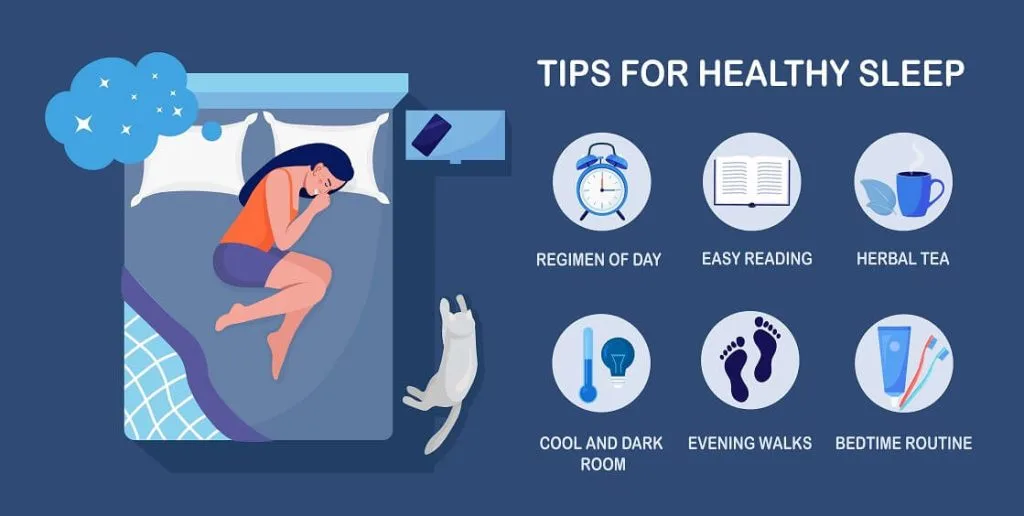Another night you’ll spend with Netflix instead of a nice, relaxing, deep sleep.
Did you decide on your own to force yourself not to sleep, or is something else hiding out there?
Let’s find out.
You know how good a night of healthy sleep is for us to function well.
Good sleep improves your brain performance, mood, and overall health.
Not enough sleep can lead to various diseases, both physical and mental.
We can say for sure that sleep is our superpower.
Then why don’t you use that superpower?

We all have a few nights when we stay up all night.
It is dangerous when it becomes a behavior pattern repeated night after night.
The term associated with not getting enough sleep is sleep deprivation.
Sleep is as important to us as food and water intake.
Lack of sleep can lead to various diseases, including high blood pressure, diabetes, heart attack, heart failure, or stroke.
The immune system and mental health are also under attack.
If, despite all the information, you still force yourself not to sleep.
Let’s try to explain more closely why this behavior occurs.
You don’t have a good sleeping routine

Lacking a good sleep routine sounds logical, but let’s explain it better.
Sleep, as much as it seems like an automatic action, requires certain conditions, such as comfort and peace.
Maybe sleep is not essential to you. You prefer socializing at night, watching movies, playing video games, reading books, etc.
You have been in that system for a long time and see no reason to change it.
You never go to bed at the same time and never sleep the same number of hours.
During the night, you drink coffee and energy drinks or eat meals as if it were daytime.
These are signs of poor sleeping hygiene. But you simply don’t care. That is your lifestyle, and sleep is for the weak!
And have you ever felt tired the next day? To sleep through the whole day and then wonder where the entire day went when you wake up.
Maybe these are the signs that you need to improve your sleeping habits and it’s time to start prioritizing quality sleep to get out of this endless circle going on for too long.
You have problems with sleep disorders and mental illnesses

These two things are connected. They either go hand in hand or lead to one another.
Insomnia is the most common sleep disorder.
Maybe you’ve gotten so used to the fact that you won’t be able to fall asleep that now you deliberately don’t want to and force yourself purposely not to sleep.
We must also mention night terrors and nightmares.
Night terrors are more related to children than adults, but that does not mean that adults do not suffer from them either.
When we add sleep paralysis to the mix, we have a terrible combo that will make us not want to fall asleep.
Previous traumas can be a reason for being a sleep procrastinator. You don’t want to dream about them or have them appear in your brain just when it’s time to sleep.
Depression, anxiety, and bipolar disorder can all keep you awake.
Thinking about the past or the future instead of sleeping is a wrong choice, but these disorders make you do it.
When it’s time to sleep, a light turns on in your brain, occupying it with complex and stressful topics instead of turning off and giving you a good night’s sleep.
You are a workaholic night owl
You are not that person that catches the early worm. Burning the midnight oil is your jam!
There is some connection between night and creativity.
Some people are simply more creative at night. This fact is often associated with artists and everyone involved in creative work.
Maybe you feel you are cheating because when everyone is sleeping, you get the job done, and you benefit from that.
Working at night sounds great to you, and you feel good about it. You are forcing yourself not to sleep, and you’re okay with that.
It can be good for your work in the short term, but in the long term, lack of sleep can cause you much more problems than some unfinished work.
If you have decided that it is time to stop forcing yourself not to sleep, these few tips can help you:
Set a bedtime and stick to it
It sounds complicated for someone not used to sleeping regularly, but it’s a small start leading to results.
By repeating it, you will get into a routine and eliminate the need to force yourself not to sleep.
Avoid food and drinks before going to bed

In particular, we mean coffee, energy drink, alcohol, and cigars. Heavy food right before bed is not a good choice.
It is best to have the last meal of the day at least three hours before bed.
This way, you will give your body enough time to digest food without being bothered by hunger before going to bed.
Improve your sleeping environment
The three things you need for quality sleep are comfort, peace, and quiet.
Considering that the average person spends a third of his life sleeping, it might be wise to invest in quality sleeping conditions so that your sleep is as good as possible.
Eliminate all distractions from the room where you sleep
TV and computer have no place in the bedroom. The bedroom should have a few devices and be as neat as possible.
Phones also disturb our sleep. Before going to bed, don’t look at your phone for at least an hour because it stimulates your brain and keeps you awake.
Also, turn off the sound so that various notifications don’t wake you up at night.
Another important thing is that you don’t make your room too bright or warm.
All things considered,
“Sleep is that golden chain that ties health and our bodies together.”
– Thomas Dekker
Everyone has the right to a night of sound and quality sleep, including you.
Don’t deny yourself that right. You will see the benefits of quality sleep sooner than expected.
Sweet dreams and good night!
